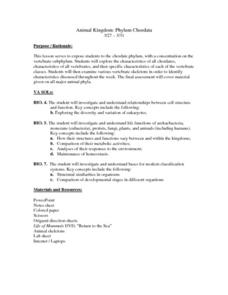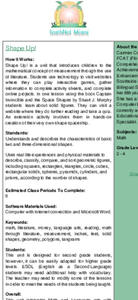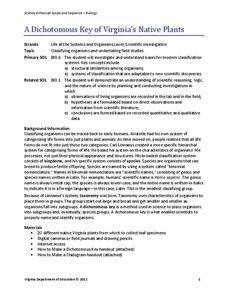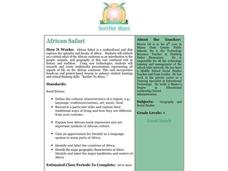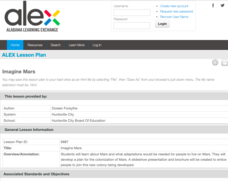Curated OER
Invertebrate Classification
Young scholars discuss the recent disovery of the "furry lobster" to peak interest in the animal kingdom. They classify various speciments using invertebrate dichotomous keys, identifying major animal phyla and classes. Thy the complete...
Curated OER
Comparative Embryological Study of
Students complete two labs. They observe the fertilization and development of sea urchin and zebrafish embryos. They examine the similarities and differences in the development of an invertebrate vs. a vertebrate animal.
Curated OER
Animal Kingdom: Phylum Chordata
Students use a dichotomous key to classify various vertebrate jar speciments into classes. They examine the speciments for general characteristics of each class and fill in a corresponding chart and then complete a few final assessment...
Curated OER
Polymers
Students explore online tutorial on polymers. For this chemistry lesson, they create two polymers in the lab and compare their properties. They write a sales letter about their new and improved polymer product.
Curated OER
Cell Reproduction and Inheritance
Pupils determine their inherited characteristics from their parents. In this biology lesson, students study the life of Mendel using an interactive website. They differentiate dominant and recessive characteristics.
Curated OER
Up, Up and Away
Third graders are presented with the problem of: Do all liquids evaporate at the same rate? The lesson contains adequate background information for the teacher. They participate in a lab experiment in order to test the scientific...
Curated OER
Turtle Sightings
Third graders research turtles and the ways they have adapted to their marine environment. They work in groups and publish their findings using SiteMaker a web-authoring tool.
Curated OER
Not Just For A Baby's Bottom
Eighth graders investigate the presence of talc in the geologic record. The different characteristics of talc is covered. The lesson includes background information for the teacher.
Curated OER
Slavery In America During the Civil War
Students continue their examination of the Civil War. In groups, they use the internet and print sources to research the life of a slave. For each slave researched, they copy quotes and other information from primary and secondary...
Curated OER
Genetic Disorders
Seventh graders discuss traits, traits that are inherited and how genes and chromosomes carry the code for traits. They research genetic disorders and their link to chromosome abnormalites and write a report on their findings. which...
Curated OER
Oceans-Coral Reefs
Second graders investigate coral reefs. For this oceanology lesson, 2nd graders discuss what constitutes a coral reef and the wildlife that lives there. Students watch a video about coral reefs and take an online quiz.
Curated OER
Television: Comedy Vs. Drama
Students investigate the world of Television by contrasting specific programs. In this visual storytelling activity, students compare and contrast the differences between comedy and drama by making a Venn Diagram. Students utilize the...
Curated OER
Splendid China
Sixth graders gain an appreciation for the traditions and vast contributions of the Chinese culture in this unit of lessons.
Curated OER
Shape Up!
Students investigate measurement through the use of literature through this series of lessons.
Curated OER
Zoom into Microscopy
Learners discover proper microscope use. In this microscopy lesson plan, students create picture books that show the detail of organisms as seen with the human eye, through a hand lens, and at each power of the microscope.
Science 4 Inquiry
Atmospheric Layers
Space diving refers to the act of jumping from outer space and falling through Earth's atmosphere before parachuting to land. Scholars learn about this extreme activity and study the layers of the atmosphere they must conquer in the...
Virginia Department of Education
Prokaryotes
Lead your biology class on a cell-sized adventure! Emerging scientists construct models of prokaryotes, then design an experiment to properly grow a bacterial culture. They conclude the activity by viewing the culture under a microscope....
Polar Trec
Animal Monitoring Introduction
Not only do mealworms taste great, they are also great for classroom science lessons. In pairs, young scientists observe and record what they see as they check out what their mealworms are doing from minute to minute. Each minute...
Virginia Department of Education
A Dichotomous Key of Virginia’s Native Plants
Can your class correctly classify plant species? Individuals explore native plants of the local environment and correctly classify them into their respective categories. They investigate differences in the plants and discuss similarities...
Curated OER
Freshwater Fish Anatomy & Taxonomy
Tenth graders use a classification key to identify organisms. For this classification lesson students identify freshwater species of fish and document their observations.
Curated OER
The Age of Reason and Enlightenment
A presentation that truly covers the age of reason and enlightenment. Nearly every facet, event, and key player in 18th Century Age of Enlightenment is covered. The information is clear, easy to follow, and lends itself well to note...
Curated OER
African Safari
Sixth graders gain an appreciation for the different cultures that inhabit the Earth by focusing on the people of Africa
Alabama Learning Exchange (ALEX)
Imagine Mars
Middle schoolers research the planet of Mars using the Internet. They analyze the factors that would enable people to live on Mars and present a slideshow presentation and brochure about Mars.
Curated OER
I Wood if I Could
Tenth graders investigate the process of how specific products are made from trees. For this chemistry instructional activity, groups of students must choose among ice cream, bubble gum, paper, toothpaste and lipstick. They research,...




